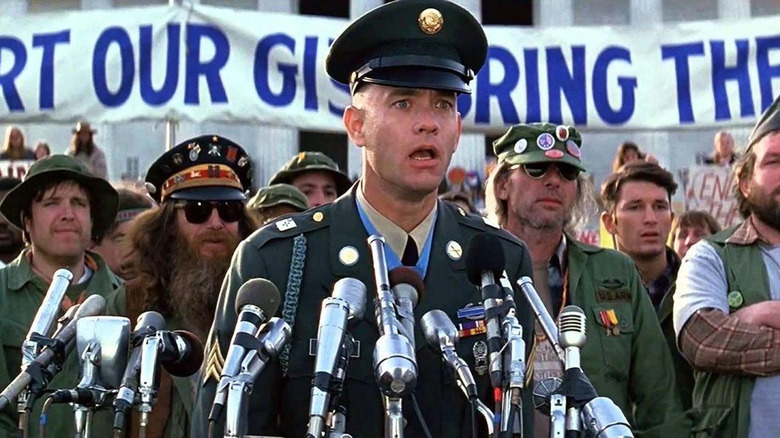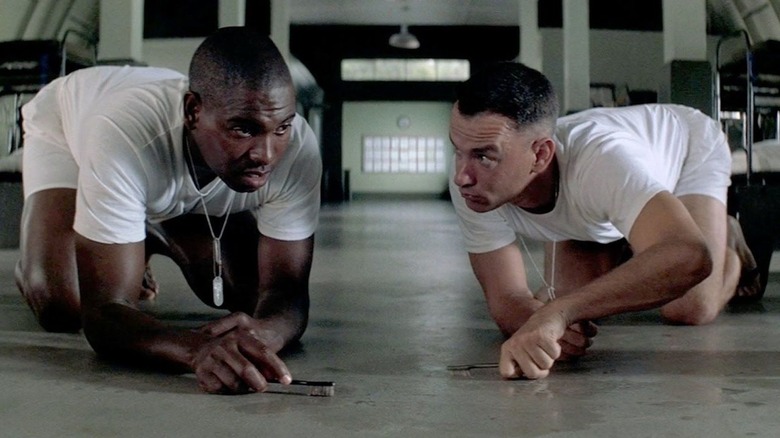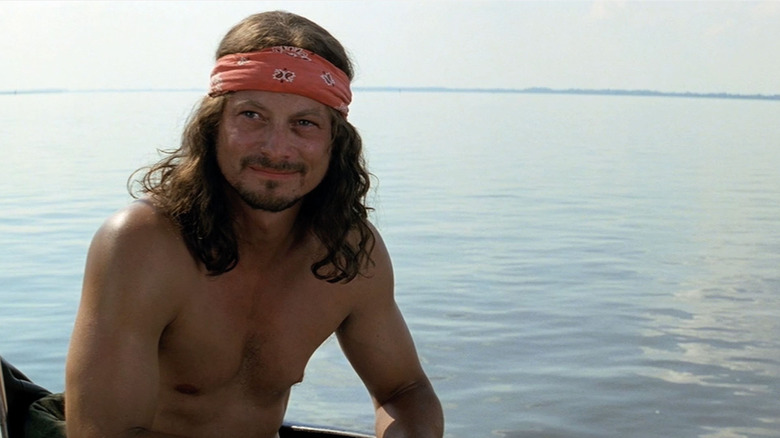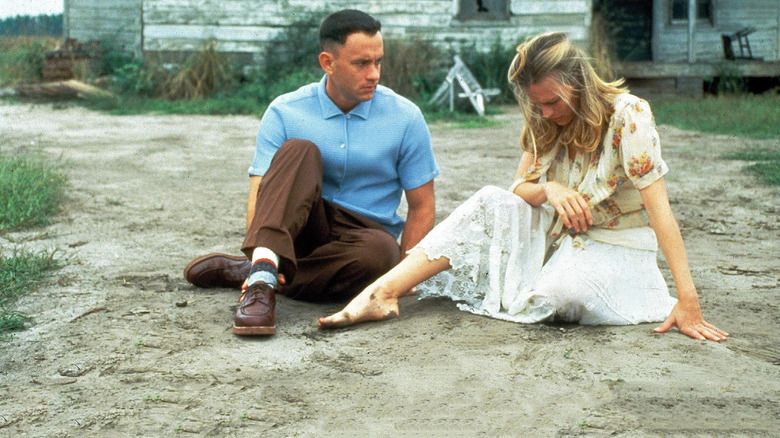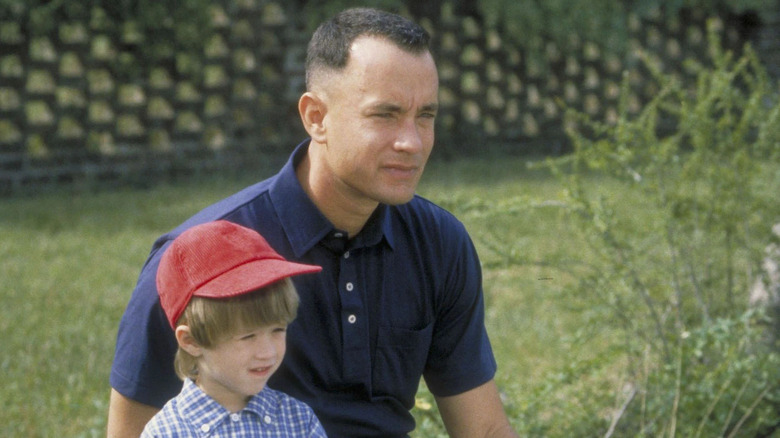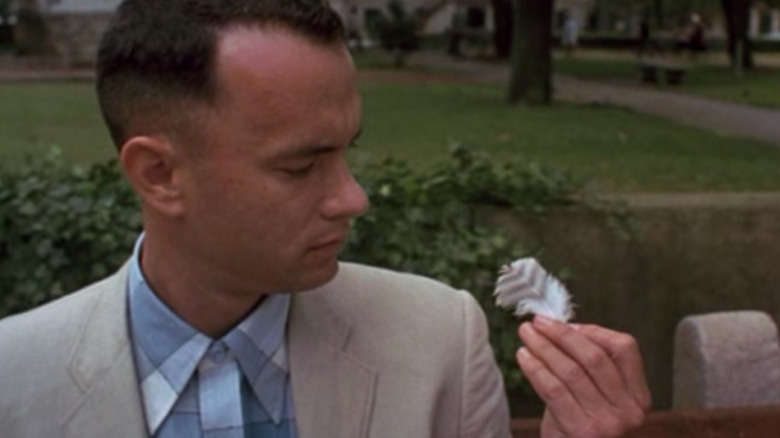Forrest Gump Ending Explained: Blowin' In The Wind
A single white feather drifts out of the sky and lands on the well-traveled sneaker of Forrest Gump (Tom Hanks), a modest man with a big story to tell. Once he's done, a breeze carries the feather away again, perhaps to find another host with another tall tale.
"Forrest Gump" is an unlikely yarn about a young man who ran from bullies, ran for America, and ran for his life (and several others) in Vietnam; a ping-pong champion, shrimp boat captain, long-distance jogging guru, and inspiration for the Smiley Face; and a simple dude devoted to the two women in his life, his mama (Sally Fields) and his best friend Jenny (Robin Wright). Along the way, Forrest also manages to bumble into major points in American history, rubbing shoulders with presidents and the future king of rock 'n' roll.
As unbelievable as some of Forrest's adventures are, screenwriter Eric Roth pared back some of the zanier incidents in Winston Groom's source novel (Forrest goes to space with an ape, for example) and brought the relationship elements to the forefront. The result was a good-natured romantic fable that became an instant pop culture moment, raking in $678 million worldwide (via Box Office Mojo) and pipping both "Pulp Fiction" and "The Shawshank Redemption" to the Best Picture Oscar.
For a film about a character as kind and open-hearted as Forrest, "Forrest Gump" has proven quite polarizing. The National Review named it among its Best Conservative Movies in 2009, while critics from the other side of the aisle have bashed it for pushing a conformist agenda and a problematic version of American history. Those arguments can certainly be made, but politics aside, it is a universal story of friendship, loyalty, and destiny, themes that are all wrapped up in the film's three-hanky ending. Let's take a closer look.
So what happens in Forrest Gump again?
After the feather chooses Forrest, we're off to the 1950s in Greenbow, Alabama, where we see him as a young boy with a low IQ and leg braces to fix a crooked spine. His determined mother Mrs. Gump (Sally Fields) tells him that he is no different from anyone else, but his slow-witted nature and the lumps of metal on his legs make him a figure of fun. He has no friends until he meets Jenny, a girl who suffers abuse at the hands of her drunken father. They become inseparable.
One day, when Forrest is running away from bullies, his leg braces fall off and he discovers that he can run really fast, an ability that determines his future. As teens, their paths diverge as Jenny gets kicked out of college and begins a downward spiral while Forrest makes the All-American football team thanks to his running prowess. After graduation, he enlists in the Army where he becomes friends with Benjamin Buford "Bubba" Blue (Mykelti Williamson), another simple lad who has a passion for shrimp. Forrest promises Bubba that they'll go into the shrimping business together once they get out.
They ship out to Vietnam, finding themselves in a platoon under the command of Lieutenant Dan Taylor (Gary Sinise). During a patrol, they are ambushed and Bubba is mortally wounded. Forrest saves several men including Lieutenant Dan, who definitely doesn't want saving. Returning to the States, Forrest is awarded the Medal of Honor and takes up ping-pong, representing his country against China.
Once he is discharged from the Army, Forrest uses his earnings from endorsing ping-pong gear to keep his promise to Bubba and buy a shrimping boat. It makes him rich, but as his wealth and standing grow, he increasingly finds himself thinking about Jenny.
Loyalty and friendship
Loyalty and friendship are key themes in "Forrest Gump." Forrest doesn't have many mates growing up, but when he does make one, it's usually a friend for life. Firstly, there is Jenny (more on her later), then Bubba, and eventually Lieutenant Dan.
Bubba is an outsider just like Forrest. He likes to talk shrimp all day and Forrest takes him completely for who he is, content to listen. He is rewarded for it; while other people might have shut down Bubba's shrimp-related ramblings, Forrest takes it all in. By keeping his promise to Bubba, getting into the shrimping business sets Forrest on the path to becoming a millionaire.
Lieutenant Dan, on the other hand, is the opposite of Forrest. He's cynical, hard-nosed, and believes it is his destiny to die on the battlefield like a string of his ancestors. Forrest just does whatever seems right at any given moment, which is why he rescues Dan despite his protests. With both his legs amputated, Dan blames Forrest for denying him an honorable death and becomes an embittered drunk with no joy in life, contemptuous of other disabled people who have found Jesus. Nevertheless, he returns Forrest's loyalty by keeping his promise to become his First Mate if Forrest ever buys a shrimp boat.
This sets up Lieutenant Dan's salvation. While Forrest prays for shrimp at church, Dan rages at God during a mighty hurricane. Having survived the storm, they start pulling in huge amounts of shrimp. Dan thanks Forrest for saving him and jumps overboard; not to kill himself, but to swim. It is a beautiful moment as Dan looks like he has come to terms with his loss and is finally able to let go of his anger. Forrest surmises that he's made his peace with God.
Jenny is a misunderstood tragic character
For all his success, Forrest just can't stop thinking about Jenny, especially after his mother passes away and leaves him alone in their home. That changes when Jenny shows up and stays for a while, sneaking into his room one night like she did when they were kids. They make love, but in the morning she is gone again.
A lot of people out there on the internet really hate Jenny, with whole forums devoted to slagging her off as the villain of the piece. The crux of these arguments is mainly that she uses Forrest when it suits her and makes him sad. It's all a bit extreme and also a fundamental misreading of the character.
Jenny's story is a tragic contrast to Forrest's. While he comes from a loving home, she was sexually and physically abused by her father, causing deep-seated trauma that drives her desire to run away and lose herself in new lives and new experiences. She can never put enough distance between herself and her past, and she is unable to find happiness, locked in a cycle of drug abuse and bad boyfriend choices.
The saddest part is that she always loved Forrest and knows that he will never harm her, but her demons won't allow her to accept the possibility that she is worthy of happiness, especially with a partner who unconditionally adores her for who she is. She starts to come around to the idea after she has a young son from the night they spent together, which helps her straighten herself out a bit. By the time she is finally ready to accept a safe and happy life with Forrest, it's too late; she has contracted an unknown virus and passes away a year after they marry.
The Taoist take on Forrest Gump
Some critics of "Forrest Gump" feel that it sends a message of obedience and conformity, centered around a character who has nothing to say. The pieces are all there if you choose to take that stance, but rather than rehash those arguments I'd prefer to look at it from another perspective. It occurred to me while researching an article on Dudeism, the religion based on "The Big Lebowski," that a similar reading could be applied to "Forrest Gump." He's certainly got the aphorisms down pat, but I guess he's not cool enough for anyone to create Gumpism.
Followers of the Church of the Latter-Day Dude regard it as a modern-day descendant of Taoism and its ancient belief that the Universe has a natural order. The only way to get the best out of life is to accept the cosmic rhythms and just go with the flow. Trying to bend these forces to your will is only a recipe for discontentment.
This definitely works in the context of Forrest. He is an empty vessel free of all vanity, content to let circumstances take him where they will. Therefore, he is better able to appreciate and receive the wonders of life. In contrast, Lieutenant Dan and Jenny both try to wrestle control of their own destiny and suffer for it; only once they accept life more like Forrest does are they able to find a measure of contentment.
Destiny is a powerful theme that runs through the entire film, and even someone as unquestioning as Forrest ponders it at one point. By the end, he finds out what his destiny was all along: To give Jenny happiness in the final days of her life and become a loving father.
Blowin' in the wind
The feather is the single most important piece of symbolism in "Forrest Gump." Firstly, it represents destiny itself, finding its way to Forrest so we can hear his tale. Did it find its way there by pure chance, or was it guided by some higher force? It's a question worth asking because there are many dualities of destiny threaded throughout the film. You have Forrest and Jenny's different paths; Lieutenant Dan's steadfast belief in preordained destiny versus Forrest just going where the wind blows; and an enigma that Forrest contemplates beside Jenny's grave:
" I don't know if Momma was right or if, if it's Lieutenant Dan. I don't know if we each have a destiny, or if we're all just floating around accidental-like on a breeze, but I, I think maybe it's both. Maybe both is happening at the same time."
Another angle on the feather is that it is literally blowing in the wind, recalling Bob Dylan's famous song, which became synonymous with the protest movements of the 1960s. This ties in with Jenny as the only version of "Blowin' in the Wind" we hear in the film is sung by her on the stage of a strip club. It is a bitter irony that she dreams of becoming a famous singer like Joan Baez, another counterculture figure who recorded the song, but she only gets to perform in front of a bunch of leering men as her life begins to unravel.
Lastly, the feather represents Forrest. Unencumbered by much in the way of forethought or self-consciousness, he finds it much easier than most people to let himself go and just blow with the wind. But, as with the feather, does he make his way by pure luck, or is there something guiding him?
